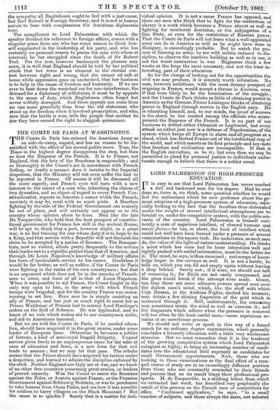THE COMTE DE PARIS AT WASHINGTON. T HE Comte de Paris
has entered the American Army as an aide-de-camp, unpaid, and has no reason to be dis- satisfied with the effect of his second public move. True, the Times in the highest degree disapproves the step, but then so does the Emperor of the French. It is to France, not England, that the heir of the Bourbons is responsible ; and so thoroughly is the Count's act in accordance with French feeling, so deadly a menace does it involve to the Imperial despotism, that the Ministry will not even suffer the fact to be reported in France. Of course it will be discussed all the more eagerly, and French eyes will turn with a new interest to the career of a man who, inheriting the claims of two dynasties, and an object of regard to every French Con- stitutionalist, repeats in America a career which the French, unwisely it may be, recal with so much pride. A Bourbon fighting by the side of the Federal Government can scarcely be out of place, and will certainly not appear so to the country whose opinion alone he fears. Men like the late De Tocqueville, who hold that the best prospect of constitu- tional government for France lies still in the ancient House, will be apt to think that a part, however slight, in a great war, is no bad training for one whose duty it is to hope to be a Sing, and that service with a Republic will not diminish his claim to be accepted by a nation of freemen. The Bonapar- tists, now so violent, allude pretty frequently to the service their leader saw in a republic pettier than that of America; and through life Louis Napoleon's knowledge of military affairs has been of incalculable service to his career. Doubtless it would be far better, as well as nobler, if the Comte de Paris were fighting in the ranks of his own countrymen ; but that is an argument which does not lie in the mouths of French- men to utter, and least of all in that of Louis Napoleon. When it was possible to aid France, the Count fought in the only way open to him, in the army with which French troops were brigaded, and for the country France was endea- vouring to set free. Even now he is ,simply assisting an ally of France, and has just as much right to assist her as Prince Waldemar of Prussia had to convey Lord Hardinge's orders on the field of Sobraon. He was applauded, and we know of no rule which makes aid to our countrymen noble, and aid to Americans immoral.
But we are told the Comte de Paris, if he needed educa- tion, should have acquired it in the great armies, under some leader of European fame. Otherwise he becomes a soldier of fortune, a kmd of semi-royal Dugald Dalgetty. Unpaid service given freely to an unprosperous cause for the sake at once of education and fame, is a new form for that evil trade to assume ; but we may let that pass. The rebuke means that the Prince should have acquired his tuition under a despotism, and learned to admire the discipline enforced by the stick. Neither England nor Italy are at war, and we know of no other free countries possessing great armies, or leaders of proved capacity. Was the Count to assist the Russians against the Poles, or Austria against France, or the Prussian Government against Schleswig Holstein, or was he perchance to take lessons from Omar Pasha, and see how it was possible for soldiers to harry villagers on the Black Mountain But the cause is so ignoble ? Surely that is a matter for indi- vidual opinion. It is not a cause France has opposed, and there are men who think that to fight for the restriction of slavery is a work which becomes a Prince almost as well as fighting for territorial dominion, or the subjugation of a free State, or even for the restriction of Russian power. That the Comte de Paris will not learn what a well-appointed army can do in America as well as he might have done in Hungary, is exceedingly probable. But to watch the pro- cess of forming an army, to see wild militia reduced to dis- cipline, to observe the machine building as well as in use, is not the worst instruction in war. Engineers think a few weeks at the forge the most necessary, and not the least in- teresting, part of their education.
As for the charge of looking out for the opportunities the civil war may produce, it is scarcely worth refutation. No man, however ambitious, with the most dreamy prospect of reigning in France, would accept a throne in America, even if that were likely to be the termination of the struggle ; and the Comte de Paris thinks as little of obtaining power in America as the German Prince Leiningen thinks of obtaining power in England through service in the English navy. He is educating himself, and, to our minds, the proof of success is the alarm he has created among the officials who misre- present the Emperor of the French. It is no part of our business to defend either Orleanist or Legitimist, but every attack on either just now is a defence of Napoleonism, of the system which keeps all Europe in alarm and all progress at a stand, which has blotted France out of the intellectual map of the world, and which asserts as its first principle and key-note that freedom and civilization are incompatible. If that is the English conviction, so be it ; but even then we may be permitted to plead for personal justice to individuals unfor- tunate enough to believe that there is a nobler creed.






























 Previous page
Previous page